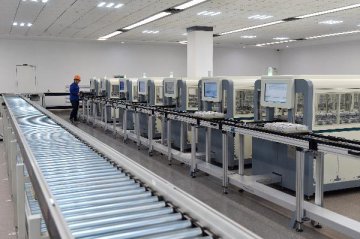AGL Energy Limited (AGL):
For an operator in the typically mundane utilities space, AGL Energy has been getting investors’ hearts racing of late. After the stock reached dizzy heights of a record $28.44 in April its shares have softened but are still up 32 per cent over the past 12 months. Now the market is split as to whether there’s more in the tank. The electricity and gas retailing major has been riding high on soaring wholesale power prices, which play to its favour because of its ‘‘long’’ position in generation compared with the electricity it needs to supply its 3.5 million-strong customer base and its power plants. With a power production portfolio anchored on its low-cost baseload coal plants – the Bayswater and Liddell pants in NSW and the Loy Yang A brown coal station in Victoria – AGL is reaping rewards from acquisitions made earlier in the decade that were questioned by some at the time. WIth the Clean Energy Target proposed by the Finkel review on energy security showing no impact to wholesale power prices until 2023, the company’s thesis of ‘‘higher for longer’’ gas and electricity prices ‘‘remains intact’’, UBS’ Nik Burns said.
Australia and New Zealand Banking Group (ANZ); National Australia Bank Limited (NAB); Commonwealth Bank of Australia (CBA); Westpac Banking Corporation (WBC):
More than half of the voters polled in eight marginal state electorates in South Australia believe the opposition parties should block the state-based bank tax because of the damage to future investment, with Australian Bankers Association chairman Andrew Thorburn saying it is ‘‘bad policy’’. The findings from Galaxy research undertaken on behalf of the ABA come as SA Liberal leader Steven Marshall heads into a party-room meeting to decide whether the Liberals will oppose the measure in the state’s upper house, where minor parties Nick Xenophon Team and the Australian Conservatives have already signalled they will block it. Mr Thorburn, the chief executive of National Australia Bank, and the current chairman of the ABA, said the unprecedented state tax will hurt investment, competitiveness and business confidence in South Australia and comes as an extra cost ‘‘at a time when South Australia can least afford it’’. The regional banks were generally in favour of the federal government’s major bank levy, causing a split in the ABA at the time, but all the banks are united in their opposition to the statebased tax.
Dexus (DXS); Propertylink Group (PLG):
Diversified investor Dexus has bought a logistics facility in Melbourne’s south-east for $50.6 million from listed fund manager Propertylink. The acquisition was funded by a bumper $500 million raising that Dexus launched in June to back two Sydney office deals, along with the Melbourne purchase. The 40,554 square metre distribution centre at 90 Mills Road in Braeside has a 12.3 average lease expiry and sits on eight hectares of land. The transaction, brokered by Colliers International’s Tony Iuliano and CBRE’s Rory Hilton, was struck on a yield of 6.1 per cent.
Downer EDI Limited (DOW); Spotless Group Holdings Limited (SPO):
Spotless has had initial talks with hostile suitor Downer EDI over potential changes to its board, but continues to insist remaining investors should reject the $1.2 billion takeover bid. Downer controls 60 per cent of Spotless, according to its most recent shareholder notice released on Thursday, giving it the power to demand board representation before its $1.15 per share cash offer officially closes on July 11. The two companies have had initial discussions over changes to Spotless’s six-member board, which is chaired by Garry Hounsell and has five nonexecutives. No timetable has been set for appointing Downer representatives to the board but changes are expected to occur over the next few weeks, with Downer taking at least three board seats. Downer chief executive Grant Fenn is likely to take one board seat while the contractor completes the takeover process.
Stockland Corporation Limited (SGP):
Stockland has launched a ‘200 homes in 100 days’ campaign in Melbourne’s northern growth corridor with prices under $500,000, or about $300,000 below the median city’s house price. The promotion coincides with the state government abolishing stamp duty for houses sold for up to $600,000. The northern growth corridor led auction activity over the weekend. The move has been welcomed by the state government, which is attempting to ease the pressure of rising prices by cutting some taxes and releasing land for sub-division. But the planning, development and building process can take years, which means continued pressure on prices.
Telstra Corporation Limited (TLS), Vocus Group Limited (VOC):
Telstra, Optus, Vodafone, Vocus, TPG Telecom and a host of other telcos and government departments will gather in Sydney on Monday to work through the major issues of the Australian telecommunications market in a forum to be run by competition tsar Rod Sims.The two-day forum is part of the Australian Competition and Consumer Commission’s communications sector market study, announced in August last year, which is seeking to understand the rapidly evolving sector and how governments and regulation are impacting the area and potentially what changes could make it more efficient. ACCC chairman Mr Sims said he wanted to get all the industry players together in one room to make sure a wide range of opinions were heard and considered. ‘‘They’re closed [to the public and media] so people can speak freely.’’ Mr Sims said.
Wesfarmers Limited (WES):
Soaring energy bills and pricing pressure from supermarket chains could force food and grocery manufacturers to close plants and shift offshore, says the new chief executive of the sector’s peak body. Australian Food and Grocery Council chief executive Tanya Barden says more domestic food and grocery suppliers will become unviable if they cannot pass on rising input costs or are forced to cut prices further as energy bills double. Ms Barden, who takes the helm of the AFGC on Monday, has rejected claims by Coles managing director John Durkan that food and grocery manufacturers are ‘‘ripping off’’ Australian consumers.
(Source: AIMS)




















Latest comments